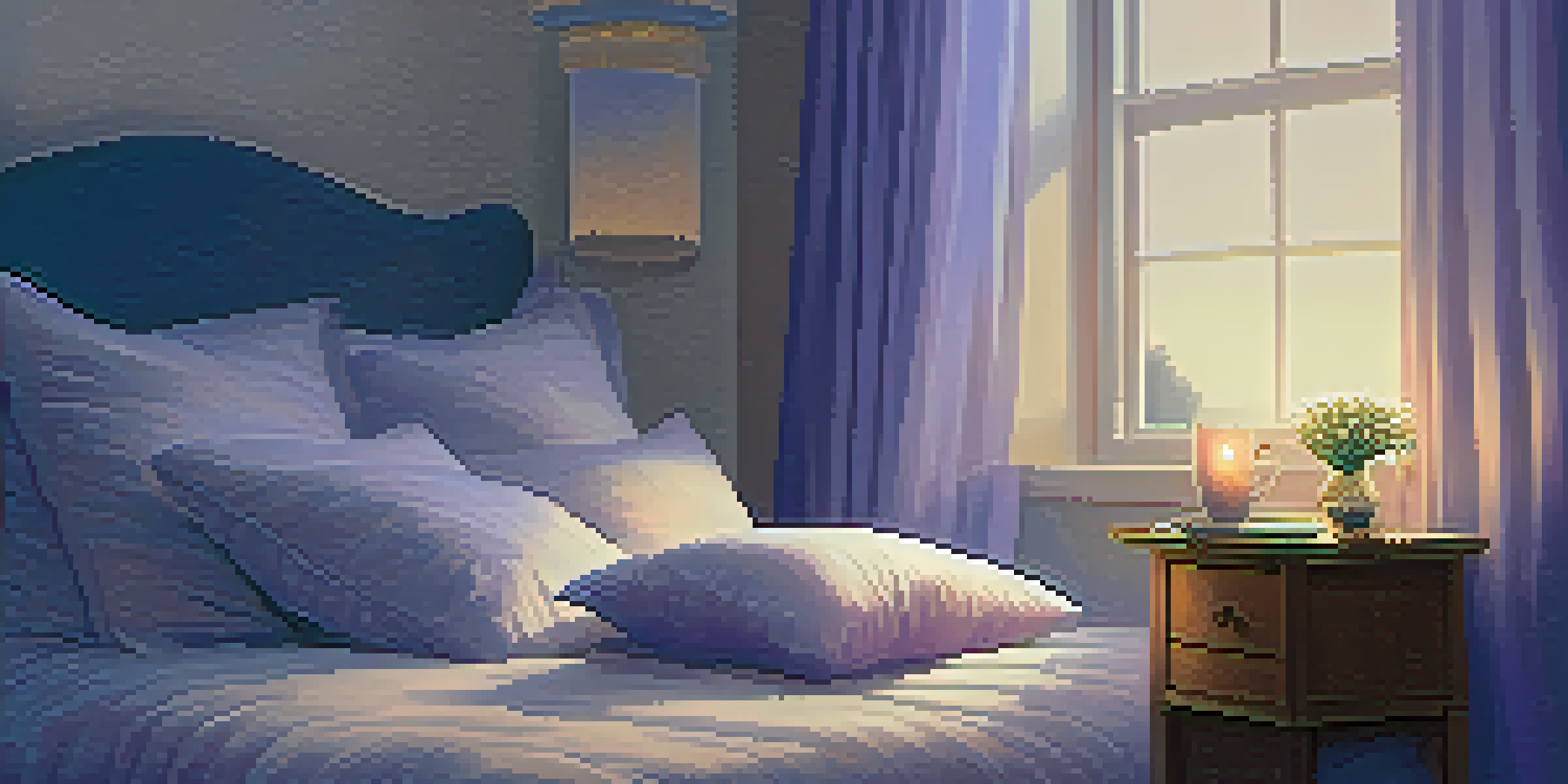Alternative Therapies for Sleep Disorders: What Works?

Understanding Sleep Disorders: An Overview
Sleep disorders can significantly impact daily life, leading to fatigue and irritability. They range from insomnia, where falling or staying asleep is difficult, to sleep apnea, characterized by interrupted breathing. Knowing the type of sleep disorder you face is essential in exploring treatment options, including alternative therapies.
Sleep is the best meditation.
Many people seek alternatives to conventional medicine for various reasons, including side effects or personal beliefs. Alternative therapies often focus on holistic approaches that treat the mind and body, rather than just symptoms. This can create a more balanced and sustainable path to better sleep.
As we dive into alternative therapies, it’s important to remember that what works for one person might not work for another. Everyone's body and sleep needs are unique, so a bit of experimentation might be required. Let’s explore some of the most popular and effective alternative therapies available.
The Power of Mindfulness and Meditation
Mindfulness and meditation are gaining popularity as effective tools for improving sleep. By focusing on the present moment, these practices help reduce anxiety and promote relaxation. This mental clarity can ease the racing thoughts that often keep us awake at night.

Studies have shown that individuals who engage in regular mindfulness practices report better sleep quality. Techniques like guided meditation or deep-breathing exercises can be particularly helpful in calming the mind before bed. Just a few minutes of focused breathing can create a peaceful transition into sleep.
Explore Alternative Sleep Therapies
Alternative therapies, such as mindfulness, herbal remedies, and acupuncture, offer holistic approaches to improving sleep quality.
To incorporate mindfulness into your routine, consider setting aside time each evening for meditation. Even simple practices, like reflecting on your day or visualizing a calm scene, can signal to your body that it's time to wind down. Consistency is key to reaping the full benefits of mindfulness.
Herbal Remedies: Nature’s Sleep Aids
Herbal remedies have been used for centuries to promote relaxation and improve sleep. Common options include chamomile, valerian root, and lavender, each known for their calming properties. These natural solutions can be a gentle alternative to over-the-counter sleep medications.
The greatest wealth is health.
For example, chamomile tea is often enjoyed before bed for its soothing effects. Valerian root is available in capsules and has been linked to decreased time taken to fall asleep. While these remedies are generally safe, it’s wise to consult with a healthcare provider before starting any new supplement.
Incorporating herbal remedies into your evening routine can enhance your overall sleep environment. Consider lighting a lavender-scented candle or sipping on herbal tea to create a calming atmosphere. Nature can be a powerful ally in achieving restful sleep.
Cognitive Behavioral Therapy for Insomnia (CBT-I)
Cognitive Behavioral Therapy for Insomnia (CBT-I) is an evidence-based approach that helps individuals address the thoughts and behaviors contributing to their sleep issues. It focuses on changing negative thought patterns and developing healthy sleep habits. Many studies show that CBT-I can be as effective as medication for treating insomnia.
Through techniques like sleep restriction and stimulus control, CBT-I encourages individuals to create a more favorable sleep environment. By breaking the cycle of anxiety and poor sleep, this therapy empowers individuals to regain control over their sleep patterns. It’s a structured, goal-oriented approach that often yields long-term results.
Lifestyle Changes Enhance Sleep Quality
Simple lifestyle adjustments, like maintaining a sleep schedule and creating a calming bedtime routine, can significantly improve sleep.
For those who struggle with insomnia, seeking a trained therapist who specializes in CBT-I can be beneficial. The skills learned through this therapy can have a lasting impact on sleep quality and overall well-being. This approach takes commitment, but many find it rewarding.
Acupuncture: Ancient Practice with Modern Benefits
Acupuncture, a traditional Chinese medicine practice, involves inserting thin needles into specific points on the body. Many people find relief from sleep disorders through this method, as it promotes relaxation and may help regulate the sleep-wake cycle. The practice is thought to balance the body’s energy, or 'Qi', contributing to overall wellness.
Research has shown that acupuncture may help reduce insomnia symptoms and improve sleep quality. While results can vary, some individuals experience significant improvements after just a few sessions. It's a holistic approach that addresses both physical and mental aspects of sleep.
If you're considering acupuncture for sleep issues, look for a licensed practitioner experienced in treating sleep disorders. This ancient practice could be the key to unlocking a more restful night’s sleep and may complement other therapies you’re exploring.
Lifestyle Changes: Simple Steps to Better Sleep
Sometimes, small lifestyle changes can make a big difference in sleep quality. Establishing a regular sleep schedule, reducing screen time before bed, and creating a relaxing bedtime routine are all effective strategies. These habits signal to your body that it's time to wind down and prepare for sleep.
Incorporating physical activity into your daily routine can also promote better sleep. Regular exercise helps reduce stress and anxiety, which can interfere with sleep. However, try to avoid vigorous workouts close to bedtime, as they might have the opposite effect.
Seek Professional Help When Needed
If sleep issues persist despite trying various methods, consulting a healthcare provider is essential for identifying underlying conditions.
Another crucial factor is your sleep environment. Keeping your bedroom dark, cool, and quiet can foster better sleep. Consider investing in blackout curtains or a white noise machine to create an ideal sleeping space.
When to Seek Professional Help for Sleep Disorders
While alternative therapies can be effective, there are times when professional help is essential. If you find that your sleep issues persist despite trying various methods, it may be time to consult a healthcare provider. They can help identify any underlying medical conditions contributing to your sleep disorder.
Sleep disorders like sleep apnea or restless leg syndrome may require specialized treatment. A healthcare professional can guide you through the appropriate tests or referrals to sleep specialists. Early intervention can prevent more severe complications down the line.

Don’t hesitate to reach out for help if you’re struggling with sleep. Quality sleep is crucial for overall health, and seeking assistance is a proactive step towards improvement.